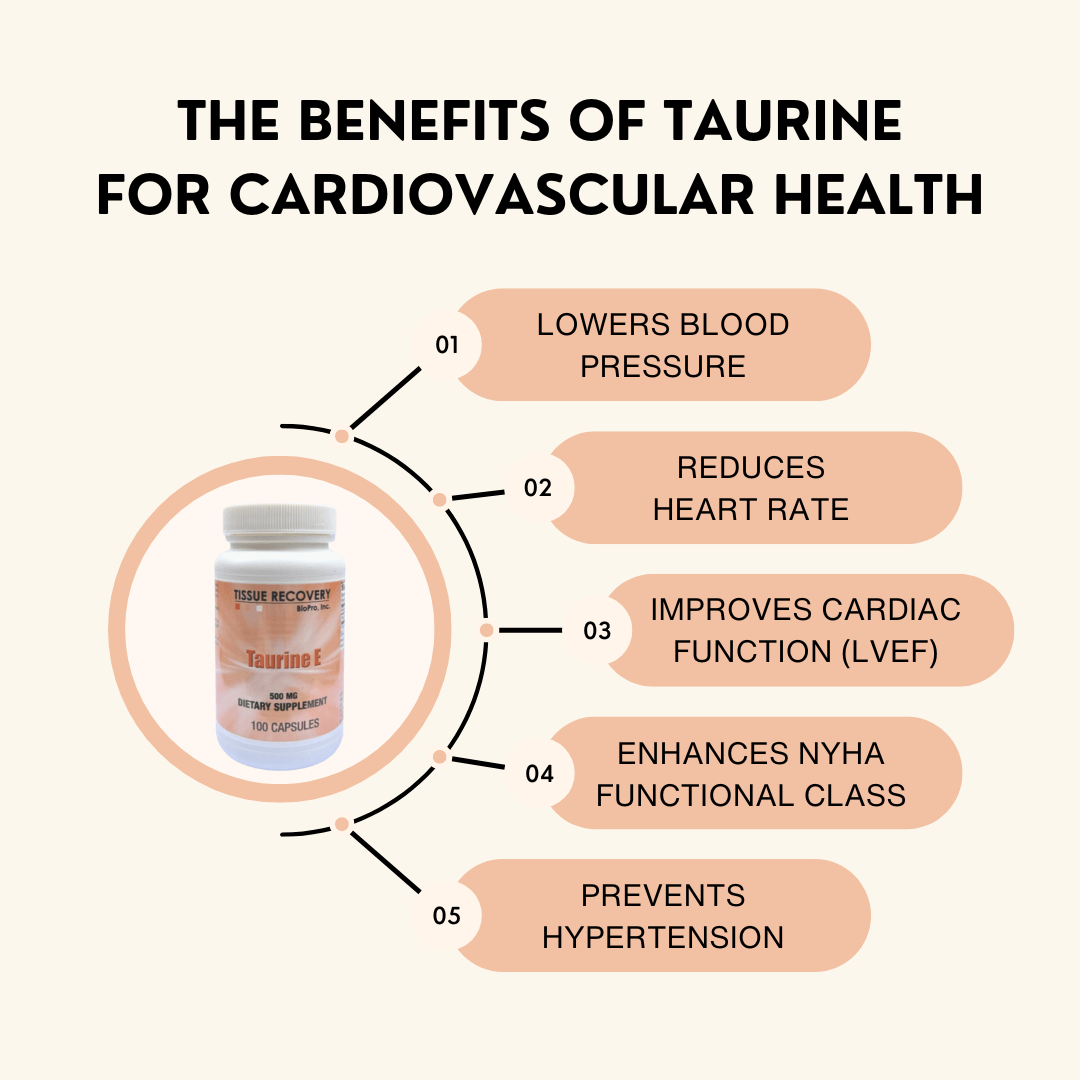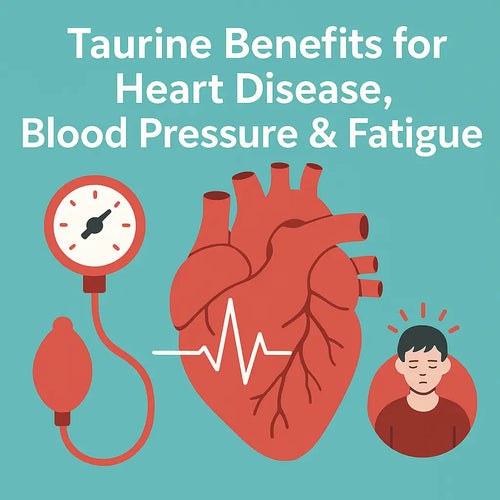
Taurine isn't just an amino acid found in energy drinks - it’s showing great promise for improving cardiovascular health. A recent meta-analysis sheds light on how taurine impacts key heart-related metrics, such as blood pressure, heart rate, and overall heart function. If you're concerned about heart health or cardiovascular disease (CVD), taurine might just be the nutrient you need to consider.
What is Taurine?
Taurine is an amino acid that’s essential for many bodily functions, especially for maintaining proper hydration, supporting digestion, and regulating minerals in the body. Interestingly, recent research highlights taurine’s positive impact on cardiovascular health. With CVD being the leading cause of death worldwide, finding natural ways to support heart health is critical. This is where taurine’s potential comes into play.
Taurine's Role in the Body
- Calcium regulation: Taurine helps maintain the balance of calcium within cells, crucial for proper muscle function, including the heart.
- Blood pressure regulation: Studies show taurine’s ability to reduce systolic and diastolic blood pressure.
- Antioxidant and anti-inflammatory properties: Taurine works as a powerful antioxidant, fighting off oxidative stress that can harm heart health.
These roles suggest taurine could be beneficial for those looking to prevent or manage cardiovascular conditions, but what does the latest science say?
Meta-Analysis: The Evidence on Taurine and Heart Health
A recent meta-analysis (Tzang CC et.al., 2024) reviewed 20 randomized controlled trials (RCTs) involving 808 participants to evaluate taurine’s effects on cardiovascular health. The study focused on several key indicators of heart function: heart rate, systolic blood pressure (SBP), diastolic blood pressure (DBP), left ventricular ejection fraction (LVEF), and New York Heart Association (NYHA) Functional Classification. These metrics provide a holistic view of heart performance and cardiovascular risks.
Key Findings:
-
Heart Rate (HR): Taurine significantly reduced heart rate by an average of 3.579 beats per minute (bpm). This might not sound like much, but even small reductions in heart rate can have long-term benefits for cardiovascular health.
-
Systolic Blood Pressure (SBP): Taurine was linked to a 3.999 mm Hg reduction in SBP. Lowering systolic pressure is critical in reducing the risk of heart attacks and strokes.
-
Diastolic Blood Pressure (DBP): A slight reduction in DBP (1.435 mm Hg) was also observed, showing taurine’s potential for helping manage hypertension.
-
Left Ventricular Ejection Fraction (LVEF): Taurine increased LVEF by 4.981%. LVEF measures how much blood the left ventricle pumps out with each contraction - an essential indicator of heart strength. An increase in this percentage means better heart function.
-
New York Heart Association (NYHA) Functional Classification: This classification grades heart failure based on symptoms during physical activity. Taurine improved NYHA class by 0.403, meaning patients could engage in more activities with fewer symptoms.
Dose-Dependent Effects: How Much Taurine is Needed?
Interestingly, the meta-analysis explored whether taurine’s effects were dose-dependent. While reductions in heart rate and blood pressure were observed, the relationship between higher taurine doses and cardiovascular improvements wasn’t strictly linear. However, moderate dosing still provided significant benefits without adverse effects. Most studies suggest that taking taurine in doses of 1-3 grams per day is effective for improving cardiovascular outcomes.
Who Benefits the Most?
Subgroup analyses showed that taurine is particularly beneficial for certain populations:
- Heart failure patients: Taurine improved heart rate, LVEF, and NYHA class in individuals with heart failure, making it a potential supportive therapy for managing heart failure symptoms.
- Healthy individuals: Even people without cardiovascular disease saw reductions in heart rate and systolic blood pressure, indicating taurine's preventive potential.
- Hypertensive patients: Those with high blood pressure showed the most significant drops in diastolic pressure, which is vital for reducing long-term hypertension risks.
This suggests taurine could be a valuable addition to the daily routine for anyone at risk of CVD, not just those already diagnosed with heart problems.
Practical Applications: Should You Be Taking Taurine?
Given the findings from this meta-analysis, taurine supplementation could be an easy and effective way to support cardiovascular health. Whether you’re trying to lower your blood pressure, improve heart function, or simply boost overall heart health, taurine shows promise.
One way to add taurine to your routine is through Taurine E, a supplement designed to enhance energy metabolism and improve cardiovascular function. As taurine also supports energy production and muscle performance, it’s a well-rounded choice for overall health.
Taurine E specifically helps:
- Boost energy levels
- Support heart function by improving calcium balance and reducing oxidative stress
- Lower blood pressure, as demonstrated in pre-hypertensive individuals
Taurine: More Than Just Heart Health
Taurine’s benefits extend beyond just heart health. Research also indicates that it can:
- Reduce cellular aging
- Improve mitochondrial function, which supports energy production and combats aging
- Boost energy metabolism in muscles, liver, and adipose tissue, enhancing overall physical performance
- Protect against inflammation and oxidative stress
These taurine benefits make it a powerful supplement not just for those at risk of CVD but also for anyone looking to enhance overall vitality and longevity.
The Bottom Line: Taurine for a Healthier Heart
The evidence is clear: taurine supplementation offers significant cardiovascular benefits, especially in reducing blood pressure and improving heart function. Whether you’re managing an existing heart condition or simply trying to prevent future issues, taurine could be a valuable addition to your daily regimen.
If you’re interested in exploring taurine supplements, consider trying Taurine E for a convenient way to support your heart health and energy levels.
FAQs
1. What is taurine?
Taurine is an amino acid found naturally in the body that helps regulate heart function, hydration, and mineral balance.
2. Can taurine help with blood pressure?
Yes, taurine has been shown to lower both systolic and diastolic blood pressure, particularly in hypertensive individuals.
3. How much taurine should I take?
Most studies suggest taking 1-3 grams of taurine per day for cardiovascular benefits.
4. Is taurine safe?
In the studies reviewed, no significant adverse effects were reported, making taurine a safe option for most people.
5. Where can I find taurine supplements?
You can try Taurine E for a high-quality taurine supplement designed to support heart health and energy.
Reference
Tzang CC, Lin WC, Lin LH, Lin TY, Chang KV, Wu WT, Özçakar L. Insights into the cardiovascular benefits of taurine: a systematic review and meta-analysis. Nutr J. 2024 Aug 15;23(1):93.









